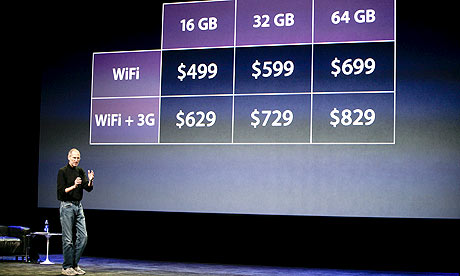- guardian.co.uk, Thursday 28 January 2010 17.43 GMT
- Article history

While Steve Jobs has announced US pricing for the iPad, Apple is keeping the UK prices under wraps untl the launch in March. Photograph: Ryan Anson/AFP/Getty
Apple has surprised would-be buyers of its new iPad touchscreen computer, saying it will not announce UK prices before it launches at the end of March.
Although it announced US prices for all six versions of the touchscreen "tablet" device with and without 3G connectivity at the launch on Wednesday night by Apple's chief executive Steve Jobs, the UK office said today that there will be no UK prices offered until the launch, expected in 60 days' time – or 90 days for the 3G versions.
However, the MacWorld magazine website takes an "educated guess" at UK pricing for the iPad, which it predicts will range from £388 to £591 for the Wi-Fi model, and £490 to £693 for the Wi-FI and 3G model.
The iPad is a 9.7in tablet computer with a virtual keyboard which can surf the web, do email, display ebooks and play video. US prices start at $499 for a basic version with Wi-Fi wireless networking but no 3G connectivity, rising to $829 for a 3G version with 64 gigabytes of storage. However iPad users in the US will have to pay separately for 3G data plans being sold separately by Apple's exclusive mobile partner there, AT&T, which already supplies the
Mobile phone companies in the UK – O2, Orange, T-Mobile and Vodafone – are looking to strike similar deals in Europe ahead of a launch later in the year. The Guardian understands from multiple source that no choice has been made.
Apple initially sold the
Andrew Harrison, UK chief executive of the Carphone Warehouse, Europe's largest independent mobile phone retailer, commented: "To me, the really interesting thing is what we are seeing is devices designed with how the consumer uses the internet very much in mind, rather than just a computer that was made for business use trying to fit the consumer."
Bloggers and commentators had mixed reactions to the device. It cannot run Adobe's Flash software, used by many advertisers and games companies online to create eye-catching motion on web pages, which some see as essential to web browsing. Many women were dismayed by the name: the San Francisco Examiner pointed out that "for North American women the word 'pad' means but one thing, a sanitary napkin". But Nick Carr, author of The Big Switch, about the move towards cloud computing, described the launch as "the day the PC died", saying that Apple "wants to deliver the killer device for the cloud era, a machine that will define computing's new age in the way that the Windows PC defined the old age."
Without a price ahead of the launch it may be difficult for retailers to judge the public's interest – and so whether the device will sell in large or small numbers. Amazon's Kindle, which includes mobile networking in the price, only launched recently in the UK, and Amazon has never disclosed sales numbers, though it is reckoned to have sold only about 500,000 to the end of last year.
The decision to keep the UK price under wraps is unusual for Apple, which usually announces UK pricing simultaneously with any launch, and could either indicate concern about exchange rate fluctuations, or a desire to keep people intrigued about the device, or that non-US networks are seeking to sell it with some sort of subsidy.
Already several UK mobile phone companies subsidise the cost of laptops to persuade customers to sign up for long-term mobile broadband contracts. Anyone signing up to a two-year mobile broadband deal with T-Mobile at £40 a month, for instance, gets a free Sony Vaio laptop worth £499.
However, Apple has forced AT&T to give up persuading customers to sign long-term contracts in order to subsidise the iPad; instead, it will effectively be available on what in Europe would be seen as a 30-day rolling Sim-only contract such as those offered by O2 and Vodafone.
"It does not look as though it has the traditional subsidy model," said Harrison. "If you put Wi-Fi and 3G in it, it is actually more expensive not less expensive."
In a note relating AT&T's financial prospects following the news, Jonathan Schildkraut, analyst at Jefferies & Co investment bank said the tariffs are "in line with the current data add-on options available with voice packages, and well below the roughly $60 plans currently offered by wireless carriers for a laptop card. The prepaid plan can be activated directly from the iPad and, because there is no contract, can be canceled at anytime."
Meanwhile anyone who already has a wireless broadband "dongle" under a long-term contract and is thinking about installing its SIM card into an iPad will be disappointed. The iPad is the first mass-market mobile device to use micro-Sim cards, which are smaller than the current range of Sim cards and were designed for small consumer gadgets such as Birmingham-based Lok8u's range of wireless-enabled wrist watches.
The iPad is also likely to prove a major headache for makers of similar devices, especially Taiwan's Asus which recently announced plans for its own tablet, and Nokia which last year unveiled a "booklet" computer with built-in 3G. There are also understood to be several tablet computers running Google's Android software in the works, with France's Archos rumoured to be planning to release one in March.








.jpg.jpg.crop_display.jpg)

0 comments:
Post a Comment